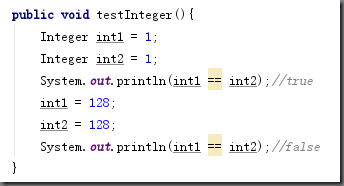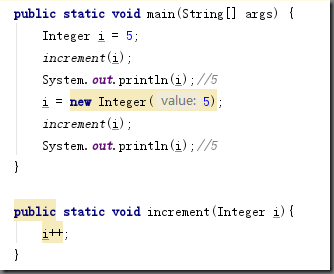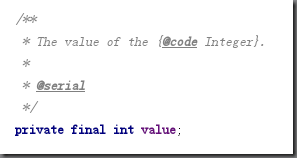走近Java之包装器类Integer
前几天,有个同事问了我一个关于Integer类赋值的问题,很有意思,我们一起来看一下(如果有说的不正确的地方,欢迎大家指正)。
如上图,同样是赋值,但是两次比较的结果完全不同。我们走近了解一下。
在Integer中,有一个静态内部类IntegerCache,其内有一个Integer缓存数组,范围从-128到127
private static class IntegerCache {
static final int low = -128;
static final int high;
static final Integer cache[];
static {
// high value may be configured by property
int h = 127;
String integerCacheHighPropValue =
sun.misc.VM.getSavedProperty("java.lang.Integer.IntegerCache.high");
//此处if是处理VM入参,可忽略
if (integerCacheHighPropValue != null) {
try {
int i = parseInt(integerCacheHighPropValue);
i = Math.max(i, 127);
// Maximum array size is Integer.MAX_VALUE
h = Math.min(i, Integer.MAX_VALUE - (-low) -1);
} catch( NumberFormatException nfe) {
// If the property cannot be parsed into an int, ignore it.
}
}
high = h;
//构造一个长度是256的Integer数组
cache = new Integer[(high - low) + 1];
int j = low;
//遍历赋值-128到127
for(int k = 0; k < cache.length; k++)
cache[k] = new Integer(j++);
// range [-128, 127] must be interned (JLS7 5.1.7)
assert IntegerCache.high >= 127;
}
private IntegerCache() {}
}
当执行赋值语句的时候,会调用Integer的valueOf方法,此方法会判断入参大小,如果在-128到127之间,就直接返回cache数组中的值,否则才会创建Integer对象。
再看另外一个问题.为什么i的结果都是5.
Integer是不可变类。在Integer类中,value被定义为final,每一次赋值方法返回的都是新的对象,而不是改变value的值。也是因为这个原因,为了提高性能,所以才有cache的Integer数组。
Java中的8个包装器类,以及String,均是不可变类。
作者:wangl110
本文版权归作者和博客园共有,欢迎转载,但未经作者同意必须在文章页面给出原文连接,否则保留追究法律责任的权利。







 浙公网安备 33010602011771号
浙公网安备 33010602011771号